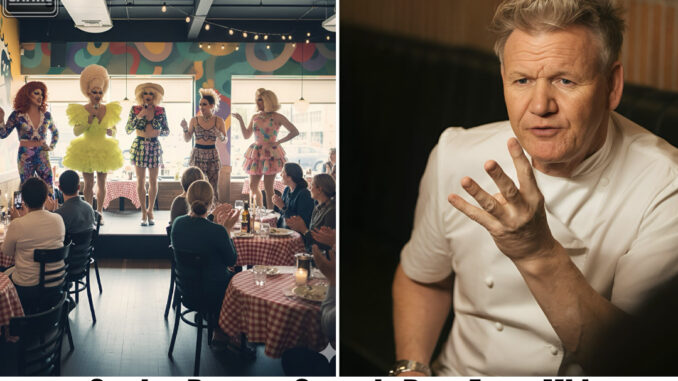
Celebrity chef Gordon Ramsay, known for his fiery temper in the kitchen and global culinary empire, is reportedly at the center of controversy after allegedly halting a drag show at one of his restaurants. According to online reports, Ramsay reportedly interrupted a scheduled “Drag Pride Dinner” mid-performance, stating he did not want what he allegedly called “woke Pride crap” in his establishment.
The event, organized by an outside planner, was reportedly intended as a celebration of LGBTQ+ culture, featuring performers in drag entertaining diners. Sources claim Ramsay entered the dining area during the performance, called out the show, and ordered it stopped immediately. One alleged quote attributed to him was: “We serve beef, not politics,” reflecting a purported desire to maintain a traditional restaurant atmosphere.
While the story has spread across social media and smaller news outlets, it is important to note that there has been no confirmation from major mainstream media sources or from Ramsay’s representatives. The restaurant involved has not been officially identified, and no verified statements have been released to confirm or deny the events described. This lack of verification raises questions about the accuracy of the reports and the reliability of the sources.
Despite the uncertainty, the alleged incident has ignited discussions among fans and food critics alike. Many have expressed disappointment, seeing the alleged action as a rejection of inclusivity and diversity within the hospitality industry. Social media platforms have been flooded with reactions, with some criticizing the alleged stance as intolerant, while others defended the chef, suggesting that restaurant owners should have control over the events held in their establishments.
If true, the incident highlights the tension between traditional restaurant branding and evolving social expectations. In recent years, there has been a growing emphasis on inclusivity, with many establishments actively supporting LGBTQ+ events and causes. A high-profile figure like Ramsay taking a firm stance against such an event—whether accurate or not—could have implications for his public image and business operations, especially given his large following and the global reach of his brand.
It is also worth noting that celebrity chefs are frequently subject to rumors and sensationalized reporting. Ramsay, in particular, has a history of controversial headlines, many of which have been exaggerated or taken out of context. As such, any claims should be treated cautiously until verified by reliable sources.
For now, the story remains unconfirmed, though it has sparked a broader conversation about the role of social values in the restaurant industry. Whether Ramsay actually made the comments and halted the performance, or if the story has been amplified for shock value, it underscores the scrutiny that public figures face in balancing personal beliefs, brand identity, and societal expectations.
In the world of celebrity chefs, where reputation is as important as culinary skill, even unverified reports can ignite debate and influence public perception. As fans and critics continue to weigh in, the alleged incident serves as a reminder of the delicate intersection between entertainment, business, and social responsibility.
